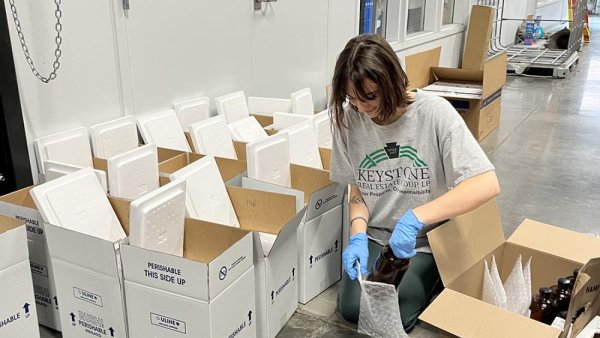Growing Impact: Climate change, extreme heat, and infant health
Heat significantly affects pregnant women and infants, increasing risks like dehydration, heat exhaustion, and developmental issues in children. Expectant mothers are more vulnerable due to physiological changes, while infants face heightened danger because of immature temperature regulation. These challenges are further intensified for families with limited resources. Researchers are investigating these impacts to provide lawmakers with the knowledge needed to create protective measures for these at-risk groups.
Seed Grant Projects
EMS faculty members earn National Academies US-African Frontiers Fellowships
| psu.edu
Two faculty members in the College of Earth and Mineral Sciences have been awarded the prestigious U.S.-Africa Frontiers Fellowships by the National Academies of Sciences, Engineering and Medicine to build high-impact research collaboration and strengthen capacity building with African scientists. In addition, three African scientists will be visiting Penn State.
Mentions
-
Nelson Yaw Dzade
Assistant Professor, John and Willie Leone Department of Energy & Mineral Engineering (EME) -
Nutifafa Yao Doumon
Assistant Professor and Virginia S. & Philip L. Walker Jr. Faculty Fellow, Materials Science and Engineering -
Lee Kump
Charlie Anderson to lead Plant Biology intercollege graduate program
| psu.edu
Professor of Biology Charles T. Anderson has been named the new chair of the intercollege graduate degree program in plant biology in the Huck Institutes, succeeding longtime program head Teh-hui Kao.
Mentions
-
Charles Anderson
-
Christina Grozinger
Distinguished Professor and Publius Vergilius Maro Professor of Entomology, Entomology -
Teh-hui Kao
O'Connor named acting director of Penn State Climate Consortium
| psu.edu
As acting director of the Penn State Climate Consortium, Jacqueline O’Connor will continue to advance interdisciplinary research efforts that address environmental challenges and serve communities in Pennsylvania and beyond.
Mentions
Growing Impact: Climate change, extreme heat, and infant health (Preview)
| youtu.be
Full episode release date: July 1, 2025. Heat significantly affects pregnant women and infants, increasing risks like dehydration, heat exhaustion, and developmental issues in children. Expectant mothers are more vulnerable due to physiological changes, while infants face heightened danger because of immature temperature regulation. These challenges are further intensified for families with limited resources. Researchers are investigating these impacts to provide lawmakers with the knowledge needed to create protective measures for these at-risk groups.
Mentions
Seed Grant Projects
Ten interdisciplinary research teams awarded IEE seed grants
| psu.edu
More than 30 researchers from seven Penn State colleges received seed funding from the Institute of Energy and the Environment to advance innovative, early-stage work addressing critical energy and environmental challenges.
Mentions
-
Benjamin Lear
-
Jonathan Mathews
-
James Adair
-
Yi Zhang
-
Rui Shi
-
Joshua D. Lambert
-
Elizabeth Elacqua
-
Bert Chandler
-
Kenneth Knappenberger
-
Raymond E. Schaak
-
Joshua Robinson
-
Malgorzata Kowalik
-
Adri van Duin
-
Randy L. Vander Wal
Professor, John and Willie Leone Department of Energy & Mineral Engineering (EME) -
Yuan Tian
-
Andrew Patterson
-
Jordan Bisanz
-
Jeffrey Peters
-
Ashley Shay
-
Craig Praul
 Craig Praul
Craig Praul -
Benjamin Anderson
 Benjamin Anderson
Benjamin Anderson -
Nathan Keim
-
Patrick Mather
-
Julian Wang
-
Sebanti Chattopadhyay
-
Manzhu Yu
-
Hong Wu
-
Sarah Rajtmajer
-
Anirudh Subramanyam
Assistant Professor, Marcus Department of Industrial and Manufacturing Engineering -
Mort Webster
-
Mook Bangalore
-
Kaitlyn Spangler
-
Praharsh Patel
-
Alejandra Armesto
Seed Grant Projects
Kao steps down as plant biology graduate program chair
| psu.edu
Teh-hui Kao, distinguished professor of biochemistry and molecular biology, has stepped down as chair of the Intercollege Graduate Degree Program in Plant Biology after 26 years in the role. Longtime program faculty member Charlie Anderson, professor of biology and co-director of the Center for Biorenewables, will take over as chair.
Mentions
-
Teh-hui Kao
-
Charles Anderson
-
Christina Grozinger
Distinguished Professor and Publius Vergilius Maro Professor of Entomology, Entomology
Rewriting a scientific law to unlock the potential of energy, sensing and more
| psu.edu
With help from an IEE seed grant, a research team from Penn State has broken a 165-year-old law of thermal radiation with unprecedented strength, setting the stage for more efficient energy harvesting, heat transfer, and infrared sensing.
Mentions
Seed Grant Projects
Millions in Pennsylvania may be drinking contaminated water
| newsweek.com
3.5 million people in Pennsylvania are served from private wells—65 percent of wells tested were found to contain 'forever chemicals.'
Mentions
‘Forever chemicals’ detected in 65% of sampled private wells in Pennsylvania
| psu.edu
To better understand potential contamination of the groundwater feeding the 3.5 million people served by private well systems in Pennsylvania, a team of researchers from Penn State conducted a novel three-year citizen science study of per- and poly-fluoroalkyl substances (PFAS) — often referred to as forever chemicals — in 167 private wells across the commonwealth.
Mentions
-
Heather Preisendanz
-
John (Jack) Vanden Heuvel
-
Faith Kibuye
-
Jennifer Fetter
-
Susan Boser
-
Cheryl Thompson
Professor, Interim Vice Chair for Education and Endowed Chair in Cancer Population Sciences Research, Department of Public Health Sciences -
Tamie L. Veith
Agricultural Engineer, USDA-ARS-Pasture Systems and Watershed Management Research Unit -
Kelly Kosiarski
 Kelly Kosiarski
Kelly Kosiarski
How youth culture is reimagining climate action
Young people are using culture, creativity, and digital media to reimagine climate action. See how their everyday choices are shaping a sustainable future.
Lawn story: Turfgrass data may improve urban greenhouse gas emission estimates
| psu.edu
Data that has been lost in the weeds — or more accurately the turfgrass — could help improve estimates of carbon dioxide emissions from urban areas, according to a team led by scientists at Penn State.
Mentions














































































